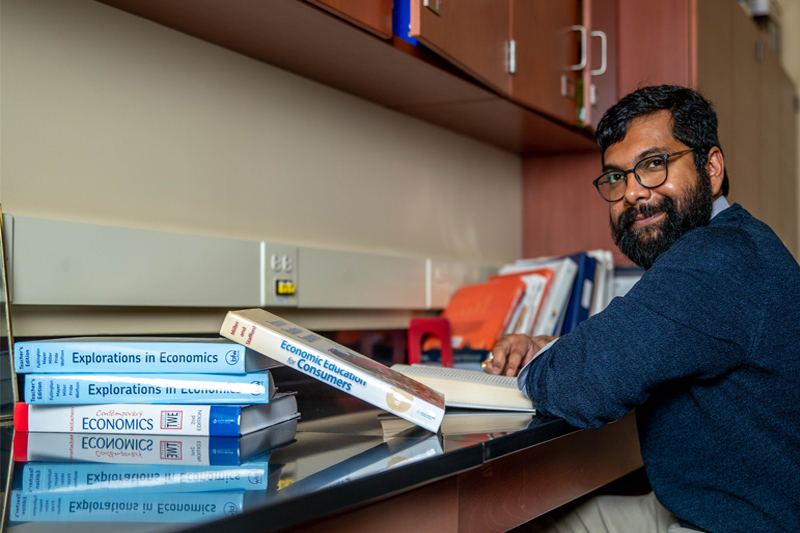
Read time:
Christopher Newport University’s Center for Economic Education (CEE) is on a mission to help teachers discover creative ways of making economics and personal finance lessons more relevant and interesting to K-12 students.
The center, located in the Department of Economics, is a wide-ranging resource for educators dedicated to instilling economic prowess in upcoming generations.
Dr. Rik Chakraborti, an assistant professor in the Department of Economics, is the new director of the center, and is intent on working with as many teachers as possible to implement effective methods of presenting students with the fundamentals of economics and personal finance. The more students are engaged in a lesson and understand how economic decisions affect their lives, the better, Chakraborti said.
“I am beyond thrilled,” Chakraborti said. “The economist’s tool kit empowers students. Students from my classes will tell you how much they enjoy seeing their analytical superpowers grow – and teaching teachers to bear the torch provides such enormous reach to a transformative skill set.”
The CNU Center for Economic Education, one of nine university-based centers in Virginia, has been a fixture at Christopher Newport since the 1980s, but since 2009 has been operating at a reduced capacity due to changes in funding to the Virginia Council on Economic Education (VCEE), which provides a grant to help run the center.
However, last summer the funding from VCEE was restored, and the CEE at Christopher Newport found new life, once again becoming a full-fledged resource for educators in 17 school systems across Hampton Roads.
The center serves as a repository for educators, providing lesson plans, workshops, classroom materials, and one-on-one training. This summer, the CEE will offer teachers an online economics institute.
The end goal, Chakraborti said, is to ensure elementary, middle, and high school students are as well versed as possible on the importance of making sound economic decisions as they move along life’s pathway. Supplementing the tools teachers have to convey effective, interesting and applicable lessons is key, he said.
Lesson plans offered by the Christopher Newport’s CEE cover a variety of applicable subjects that are rooted in economic relevance, including:
- Predicting Presidential Outcomes Based on Economic Indicators
- Life After High School: Navigating Education, Career and Debt
- Investing in Alternative Energy
“The CNU Center for Economic Education seeks to provide every student graduate with the economic and financial skills needed to thrive in our dynamic economy,” Chakraborti said. “They need to understand economics to get better at life. It will teach them how to make better decisions, and understand decisions others make around them. It will teach them to appreciate the role of moral, financial, and social incentives in all social phenomena they observe around them. All of society’s most pressing problems involve human choices.”
The center will collaborate with other CEEs in the state to hold professional development programs for teachers of grades K-12. Christopher Newport’s CEE is one of a few in the state with both office space and a dedicated library.
Chakraborti plans to hire students as assistants at the center and hopes to involve them in the professional development programs being offered to teachers.
“It’s a win-win,” Chakraborti said. “It’s a great opportunity for students to engage in serving the community by assisting the center in carrying out its mission, which aligns directly with CNU’s mission of preparing community-engaged leaders.”
Moving forward, the center’s goal is to establish similar partnerships with other groups and organizations on and off campus.
“Thinking ahead, I can see excellent prospects of collaborating with our Center for Sustainability in Education, and our teaching programs,” Chakraborti said.
The CEE’s intent is to have more than a short-term impact on students. In fact, Chakraborti said, the lessons learned with help from the center will hopefully resonate with the young people in K-12, and then in turn produce positive outcomes as those students bring their realm of economic knowledge into the college classroom.
“The center’s goal of advancing the quality of K-12 education – in decision making, entrepreneurship, and personal finance – benefits all residents of the Commonwealth, including of course, prospective Christopher Newport students and their families,” Chakraborti said. “Successful implementation of our programs translates to better prepared and more community engaged students when they show up as college students in classrooms in the Commonwealth, which allows us – college-level instructors – to do much more in our classrooms.”